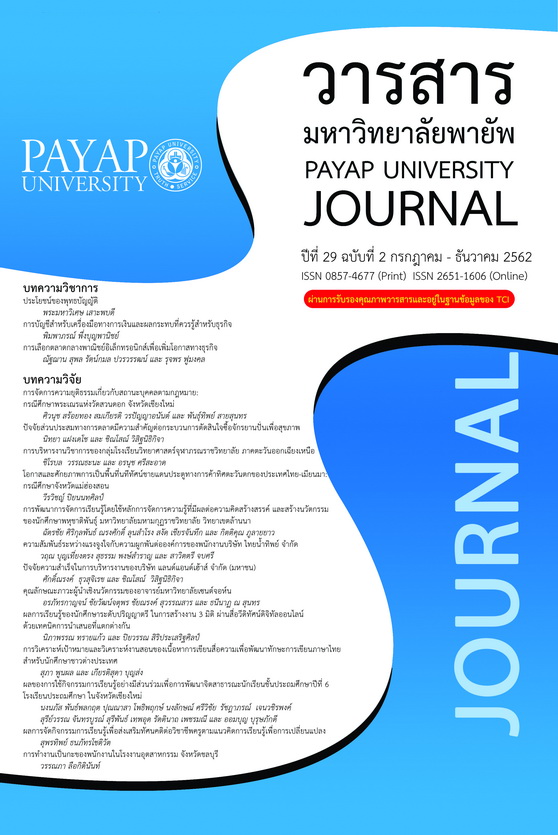Effects of Using Participatory Learning Activities for Development of Public Consciousness of Prathomsuksa 6 Students of Primary Schools in Chiang Mai Province
Main Article Content
Abstract
The purpose of this research was to compare public consciousness behavior before and after joining the participatory learning activities of 6th grade students in primary schools in Chiang Mai. The experimental group of 160, 6th grade students was chosen by the systematic sampling method. Questionnaires and participatory learning activity set were employed as data collection instruments. Data analysis was conducted through the t-test. The findings indicated that the mean score of public consciousness behavior of 6th grade students before and after participating in the learning activities was significantly different. After participating in the learning activities, the public consciousness behavior score of the experimental group improved at the 0.01 level. This data supports the findings from the follow-up interviews with teachers and students. According to the interview, the control group developed public consciousness behavior after they participated in the participatory learning activities.
Article Details
References
คณะกรรมการการประถมศึกษาแห่งชาติ หน่วยศึกษานิเทศก์ สำนักนิเทศและพัฒนามาตรฐานการศึกษา. (2545). การนิเทศเพื่อพัฒนาการวิจัยในสถานศึกษา. สำนักงานคณะกรรมการการประถมศึกษาแห่งชาติ. กรุงเทพฯ: การศาสนา.
ฐิติพร พันธวงค์. (2553). ผลของกิจกรรมกลุ่มเพื่อพัฒนาความมีจิตสาธารณะของนักเรียนชั้นประถมศึกษาปีที่ 6. สารนิพนธ์การศึกษามหาบัณฑิต (จิตวิทยาการแนะแนว) มหาวิทยาลัยศรีนครินทรวิโรฒ.
นฤมล มณีงาม. (2547). การพัฒนาโปรแกรมสร้างจิตสำนึกเกี่ยวกับการประหยัดพลังงานตามหลักการเรียนรู้ด้วยการรับใช้สังคมสำหรับชั้นประถมศึกษาปีที่ 6. วิทยานิพนธ์ปริญญามหาบัณฑิต สาขาวิชาประถมศึกษา บัณฑิตวิทยาลัย มหาวิทยาลัยขอนแก่น.
พวงรัตน์ ทวีรัตน์. (2538). วิธีการวิจัยทางพฤติกรรมศาสตร์และสังคมศาสตร์. กรุงเทพฯ: ศูนย์หนังสือจุฬาลงกรณ์มหาวิทยาลัย.
มนต์ชัย เทียนทอง. (2548). สถิติและวิธีการวิจัยทางเทคโนโลยีสารสนเทศ. กรุงเทพฯ: สถาบันเทคโนโลยีพระจอมเกล้าพระนครเหนือ.
วีระ บุณยะกาญจน. (2532). ทฤษฎีจิตวิทยาพัฒนาการเด็ก. มหาสารคาม: คณะศึกษาศาสตร์ มหาวิทยาลัยศรีนครินทรวิโรฒ มหาสารคาม.
สำนักการศึกษากรุงเทพมหานคร ศูนย์สาธารณประโยชน์และประชาคม สถาบันบัณฑิตพัฒนบริหารศาสตร์ และองค์กรเพื่อความโปร่งใสในประเทศไทย. (2553). หลักสูตรคบเด็กสร้างชาติ โตไปไม่โกง. กรุงเทพฯ: สถาบันบัณฑิตพัฒนบริหารศาสตร์.
Erickson, E. H. (1986). Identity: Youth and Crisis. New York: W. Norton.
Kohlberg, L., lickona, T. (1976). Moral Stages and Moralization: The Cognitive Developmental Approach. Theory, Research and Social Issues. New York: Holt Rinehart and Winston.
Ohlsen, M.M. (1977). Group Counseling (2nd ed.). New York: Holt, Rinehart & Winson.
Piaget, J. (1932). The Moral Judgment of the Child. London: Kegan Paul.

